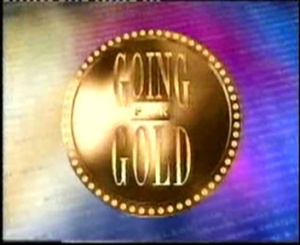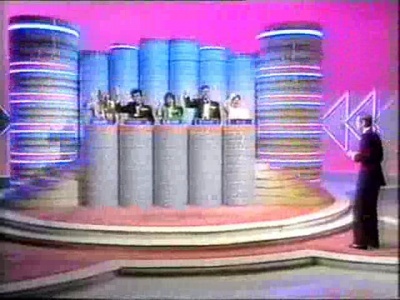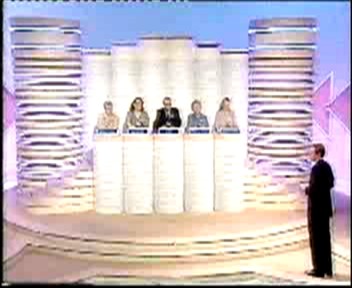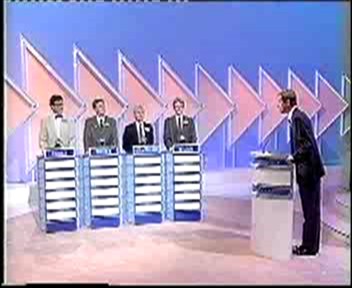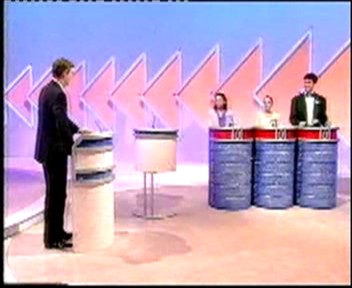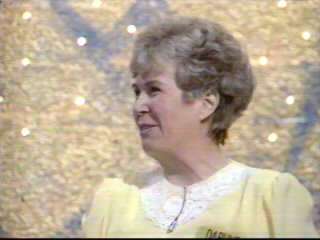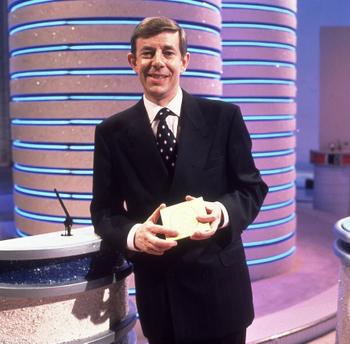Going for Gold
(→Broadcast: Additional details) |
|||
| (107 intermediate revisions not shown) | |||
| Line 1: | Line 1: | ||
| + | <div class="image">[[File:gfg1996.jpg|300px]]</div> | ||
| + | |||
<div class="box"> | <div class="box"> | ||
| + | |||
== Host == | == Host == | ||
| - | [[Henry Kelly]] | + | [[Henry Kelly]] (1987-96) |
| + | |||
| + | John Suchet (2008-9) | ||
== Broadcast == | == Broadcast == | ||
| - | Reg Grundy | + | Reg Grundy Productions for BBC1 and Super Channel, 12 October 1987 to 9 July 1996 (703 episodes in 10 series) |
| + | |||
| + | Co-produced by BBC North, 1992-96 | ||
| + | |||
| + | TalkbackThames for Five, 13 October 2008 to 20 March 2009 (105 episodes in 1 series) | ||
</div> | </div> | ||
| Line 14: | Line 23: | ||
This "Euroquiz" was both a blessing and a curse. A blessing because its production values were at least twice that of any similar show in a BBC daytime quiz slot. A curse because it hung around for far more series than it really deserved, varying the format with precisely no innovations during its long run and preventing any new shows coming to air. | This "Euroquiz" was both a blessing and a curse. A blessing because its production values were at least twice that of any similar show in a BBC daytime quiz slot. A curse because it hung around for far more series than it really deserved, varying the format with precisely no innovations during its long run and preventing any new shows coming to air. | ||
| - | Contestants from the various parts of | + | Contestants from the various parts of Europe - well, those that spoke English, anyway - flew to Elstree (or, in later series, Manchester) to appear on a show produced by Australian-owned Reg Grundy to be asked questions by Irishman for a holiday in somewhere like Seoul. Now you may have already spotted the significant home advantage in being asked a question in a familiar studio, in your mother tongue by someone with a not very straightforward accent. To ramp up the likelihood of a home winner, England, Ireland, Scotland and Wales were treated as entirely separate countries, as were the various islands around the UK! Despite this, of the show's nine continental series, the home countries could only come up with three winners. Amazing. The final series definitely gave us a home winner though as we closed the borders, and people from the UK competed for their county. |
| - | + | The programme followed the now-familiar but then revolutionary ''repechage''-style format where contestants stayed with the show for the whole week. Seven contestants would appear on Monday, and from those four answered elimination questions correctly to go into what [[Henry Kelly]] would constantly refer to as "the first round proper". The three rejects that didn't get used today, together with the three that would be knocked-out during Monday's contest, would come back on Tuesday, and so on. The contestants were revealed and taken away by means of that oh-so-80s feature, a revolving set, and most series had the contestants sitting in a 2-tier seating system, a la [[Blankety Blank]]. | |
| - | + | <div class="image">[[File:Elimination1992.jpg|400px]]''An elimination round with contestants from all around Europe.''</div> | |
| - | + | <div class="image">[[File:Elimination1996.jpg]]''An elimination round with contestants from all around the UK.''</div> | |
| - | In the "proper" round 1, the four qualifying contestants were asked a so-easy-it-hurts General Knowledge starter for one point. The contestant that answered the question correctly would then be told by | + | In the "proper" round 1, the four qualifying contestants were asked a so-easy-it-hurts General Knowledge starter for one point. The contestant that answered the question correctly would then be told by Kelly, ''"The next category is... Cheese. Select."'' which was their cue to choose between a 1, 2 or 3 point question. The first three contestants to reach six points would go onto the next round, with the losing contestant going back into the selection pool for the next show. |
| + | |||
| + | <div class="image">[[File:Firstroundproper1993.jpg]]''This is where the real action starts.''</div> | ||
"Four in a Row" was a very straight-forward game where each of three contestants would pick one of four categories and answer as many questions as they could in 40 seconds. The only real sting was that getting one answer wrong meant your score reset to zero. The categories were often slightly bizarre, such as "Sports that use balls", "Italian cities", "Vietnamese cuisine" and "Transport beginning with S". The highest scoring contestants would go through into the final. | "Four in a Row" was a very straight-forward game where each of three contestants would pick one of four categories and answer as many questions as they could in 40 seconds. The only real sting was that getting one answer wrong meant your score reset to zero. The categories were often slightly bizarre, such as "Sports that use balls", "Italian cities", "Vietnamese cuisine" and "Transport beginning with S". The highest scoring contestants would go through into the final. | ||
| - | <div class="image"> | + | <div class="image">[[File:Fourinarow1995.jpg]]''Will the real conservative party leader step forward please.''</div> |
| - | + | ||
| - | '' | + | |
It must be said, the end game was very clever. Kelly would read out a long description of a famous person, place or object (always beginning with "What am I?" or "Who am I?") that revealed more and more information as the time went on. However, the number of points available reduced from 4 down to just 1, so the quicker you could buzz in, the more points you got. | It must be said, the end game was very clever. Kelly would read out a long description of a famous person, place or object (always beginning with "What am I?" or "Who am I?") that revealed more and more information as the time went on. However, the number of points available reduced from 4 down to just 1, so the quicker you could buzz in, the more points you got. | ||
| + | |||
| + | <div class="image"><IMG src="/atoz/programmes/g/going_for_gold/goinggold1.jpg" alt="goinggold1.jpg" width="320" height="240"> | ||
| + | |||
| + | ''Host, [[Henry Kelly]]''</div> | ||
The other tactic was that you could play or pass control of the subject. Playing meant that you got the 2 point zone and the (catchphrase) "big 4 point zone", and you could only buzz in when the clock was in these zones, your opponent getting control during the 1 and 3 point zones. The situation was reversed if you passed on a subject. The person that was "playing catch-up" as Kelly put it (or "behind", as any normal person would say) would decide whether to play or pass. Answering a question wrongly meant that one of your "time zones" got passed over to your opponent, thus preventing multiple guesses in the same zone. It was nine points or more for a win. | The other tactic was that you could play or pass control of the subject. Playing meant that you got the 2 point zone and the (catchphrase) "big 4 point zone", and you could only buzz in when the clock was in these zones, your opponent getting control during the 1 and 3 point zones. The situation was reversed if you passed on a subject. The person that was "playing catch-up" as Kelly put it (or "behind", as any normal person would say) would decide whether to play or pass. Answering a question wrongly meant that one of your "time zones" got passed over to your opponent, thus preventing multiple guesses in the same zone. It was nine points or more for a win. | ||
| + | |||
| + | <div class="image"><IMG src="/atoz/programmes/g/going_for_gold/goinggold2.jpg" alt="goinggold2.jpg" width="320" height="240"> | ||
| + | |||
| + | ''The final in progress''</div> | ||
Winning a show meant you appeared in the final at the end of the week. Winning the weekly final meant going through to some semi-finals, which eventually went on to a grand final (at which point Kelly would whip out his dinner jacket). | Winning a show meant you appeared in the final at the end of the week. Winning the weekly final meant going through to some semi-finals, which eventually went on to a grand final (at which point Kelly would whip out his dinner jacket). | ||
| Line 45: | Line 62: | ||
''[[Daphne Fowler]], a UK game show veteran, thanks [[Henry Kelly]] for her prize''</div> | ''[[Daphne Fowler]], a UK game show veteran, thanks [[Henry Kelly]] for her prize''</div> | ||
| + | |||
| + | The original show perhaps dragged on a bit too long, but the basic format was sufficiently sound for it to be revived with minor modifications as [[One to Win (2)|One to Win]] in 2000, and then again under the original title in 2008, but with the modified ''One to Win'' rules still in effect. | ||
| + | |||
| + | == Champions == | ||
| + | |||
| + | {| | ||
| + | |1987-88 | ||
| + | |[[Daphne Fowler|Daphne Hudson]] (England) | ||
| + | |- | ||
| + | |1988-89 | ||
| + | |Erik Matteson (Norway) | ||
| + | |- | ||
| + | |1989-90 | ||
| + | |Howard Atkinson (England) | ||
| + | |- | ||
| + | |1990-91 | ||
| + | |Luc Sucholtz (Belgium) | ||
| + | |- | ||
| + | |1991-92 | ||
| + | |Soren Bergman (Denmark) | ||
| + | |- | ||
| + | |1992 | ||
| + | |Christine Coslett (Wales)<!--Beat Attila Brassai in the final. Final week: Jean-Marc Anfossi, Soren Thustrup, Elaine Norris, Anne McLenaghan, Chris Coslett, Ursula Mueller, Michael Hennigan, Attila Brassai--> | ||
| + | |- | ||
| + | |1993 | ||
| + | |James Deloz (Belgium)<!--Beat Billy Kenny (Ireland) in the final. Turned up as a near-finalist on the Dutch version of 'The People's Quiz' some 15 years later http://www.zangtalent.be/2/nl/79/6693/exgoingforgoldwinnaarhaaltfinalegrotevolksquizniet.html --> | ||
| + | |- | ||
| + | |1994 | ||
| + | |Mieke Poelman (The Netherlands)<!--According to Mieke Poelman, it was Mieke Poelman - regardless of it being inconsistent with INFAX. --> | ||
| + | |- | ||
| + | |1995 | ||
| + | |Sven Goll (Norway)<!--Beat Sylvia Nixon in the final, very close finish. Final day: Sven Goll, Gill Lunn, Peter Svensson, Sylvia Nixon--> | ||
| + | |- | ||
| + | |1996 | ||
| + | |Mike Ramsden (Kent)<!--Final week: Harriet Cozens, Sheila Ramsden, Duncan Heryett, Deborah Blewitt, Olga Patterson, Anthony Brown, Mike Ramsden, Elaine Cording (on a Google search, Chris Wills says Mike Ramsden)--> | ||
| + | |} | ||
| + | |||
| + | The first five series aired during the winter, split in half by the Christmas break. The sixth series went out in the autumn, the last four aired during the summer. The final BBC series featured competitors from the UK only. | ||
| + | |||
| + | The Channel 5 series was won by Iwan Thomas. | ||
== Key moments == | == Key moments == | ||
| - | The contestants would wave, smile or grimace interestingly in the show's opening sequence. There was always ''one | + | The contestants would wave, smile or grimace interestingly in the show's opening sequence. There was always ''one''. |
== Catchphrases == | == Catchphrases == | ||
| Line 54: | Line 111: | ||
"And now on to the first round proper." | "And now on to the first round proper." | ||
| - | " | + | "Incorrect - out of the rest of the question!" |
| - | " | + | "The category is (whatever) - select!" |
| - | " | + | (In the 'Four-In-A-Row' Round): "Are you ready and happy to play?" |
| + | |||
| + | "You have chosen (whatever subject), and on that subject, your time starts....now!" | ||
| + | |||
| + | (Just before the final round): "Lady and gentleman, will you please follow me - and (to the viewers) why don't you come too?" | ||
| + | |||
| + | (In the final round): "The subject is (whatever) - there's a clue on the screen for you watching at home - on that subject, will you play or pass?" | ||
| - | + | "You're playing catch-up..." | |
| - | + | "You have control of the game - time passes to you and continues....now!" | |
== Inventor == | == Inventor == | ||
| - | Based on the | + | Based on the unsold US pilot ''Run for The Money'' where it was produced by ABC and filmed at the ABC Television Center (now The Prospect Studios). |
== Theme music == | == Theme music == | ||
| - | |||
| - | |||
Composed by Hans Zimmer (who went on to compose the music to the successful movie ''Gladiator'') and Sandy McClelland. | Composed by Hans Zimmer (who went on to compose the music to the successful movie ''Gladiator'') and Sandy McClelland. | ||
| Line 76: | Line 137: | ||
The celebratedly-bad Euro soft rock tune went as follows: | The celebratedly-bad Euro soft rock tune went as follows: | ||
| + | Going for gold! | ||
The heat is on, the time is right, | The heat is on, the time is right, | ||
| - | It's time for you, for you to play | + | It's time for you, for you to play your game. |
'Cause people are coming, everyone's trying, | 'Cause people are coming, everyone's trying, | ||
Trying to be the best that they can, | Trying to be the best that they can, | ||
When they're going for... going for... Gold. | When they're going for... going for... Gold. | ||
| - | + | <div class="video"><object width="480" height="385"><param name="movie" value="http://www.youtube.com/v/n0pvFulUd98?fs=1&hl=en_US"></param><param name="allowFullScreen" value="true"></param><param name="allowscriptaccess" value="always"></param><embed src="http://www.youtube.com/v/n0pvFulUd98?fs=1&hl=en_US" type="application/x-shockwave-flash" allowscriptaccess="always" allowfullscreen="true" width="480" height="385"></embed></object><br/>''Opening titles from Series 1''</div> | |
| + | But that's not all! We bet you never knew there was another verse, but there was. As far as we know, it was only heard once, during a clips compilation in the first semi-final of series 1. And here's the lyrics for the long version (note extra bridge section too!). | ||
| + | |||
| + | Going for gold! | ||
The heat is on, the time is right, | The heat is on, the time is right, | ||
It's time for you, for you to play the game. | It's time for you, for you to play the game. | ||
'Cause people are coming, everyone's trying, | 'Cause people are coming, everyone's trying, | ||
Trying to be the best that they can, | Trying to be the best that they can, | ||
| - | To reach for the sky 'cause the stakes are so high | + | To reach for the sky 'cause the stakes are so high, |
When they're going for, going for gold! | When they're going for, going for gold! | ||
| Line 94: | Line 159: | ||
Go for it - only the best survive | Go for it - only the best survive | ||
Go for it - for gold! | Go for it - for gold! | ||
| - | Go for it and you can take | + | Go for it and you can take the prize |
Go-ing for... Gold! | Go-ing for... Gold! | ||
| Line 102: | Line 167: | ||
That's the toughest thing of all. | That's the toughest thing of all. | ||
All we need is a little more getting-it-right, | All we need is a little more getting-it-right, | ||
| - | All we need is a little more | + | All we need is a little more sa-cr-i-fice,<sup>1</sup> |
| - | Learning more and more what we're striving for, | + | Learning more and more, what we're striving for, |
When we're going for gold. | When we're going for gold. | ||
| + | |||
| + | <Instrumental> | ||
So the heat is on and the time is right, | So the heat is on and the time is right, | ||
| Line 110: | Line 177: | ||
'Cause people are coming, everyone's trying, | 'Cause people are coming, everyone's trying, | ||
Trying to be the best that they can, | Trying to be the best that they can, | ||
| - | To reach for the sky where the stakes are so high | + | To reach for the sky where the stakes are so high, |
We're all going for, going for gold! | We're all going for, going for gold! | ||
Go for it - for gold! | Go for it - for gold! | ||
| - | Go for it - only the best survive | + | Go for it - only the best survive, |
| - | Go | + | Go for it - for gold! |
| - | Go for it and you can take | + | Go for it and you can take the prize, |
Go for it - for gold! | Go for it - for gold! | ||
Go for it - only the best survive! | Go for it - only the best survive! | ||
| - | + | <sup>1</sup> This line is particularly unclear, and may be "All we need is a little more stay-in-the-fight". | |
| - | + | == Trivia == | |
| - | + | The UK version inspired the French to make their own version called ''Questions pour un Champion'', which launched across the Channel exactly one year later in 1988 where it became a huge success and is still running to this day as of 2023. Apparently, the prime time special is more popular than blockbuster films or international football matches. | |
| - | + | ||
| - | + | ||
| - | + | ||
| - | + | ||
| - | + | ||
| - | + | ||
| - | + | ||
| - | + | ||
| - | + | ||
| - | + | It is said that while the show was based at Elstree, the studio audience on occasions amounted to a grand total of… six. | |
| + | |||
| + | A staple in the 1.50pm slot, a 10.05am morning repeat would be shown the next day before children's programming for the first three series and for the second half of the fourth series. For the last series, the show moved to an earlier slot of 12.35pm. | ||
== Web links == | == Web links == | ||
| - | [http:// | + | [http://en.wikipedia.org/wiki/Going_for_Gold Wikipedia entry] |
| - | == | + | == Pictures == |
| - | [[ | + | <div class="image">[[File:Going for hold off1.jpg]]''[[Henry Kelly]] and his questions cards.''</div> |
| - | [[ | + | <div class="image">[[File:Going for hold off2.jpg]]''Host Henry Kelly, on the set of Going for Gold.''</div> |
| - | == | + | == See also == |
| + | |||
| + | [[One to Win (2)|One to Win]] | ||
| + | |||
| + | [[Weaver's Week 2005-05-08|Weaver's Week]] | ||
| - | + | == Videos == | |
| - | + | <div class="video"><object width="480" height="385"><param name="movie" value="http://www.youtube.com/v/5lieAKobWck?fs=1&hl=en_US"></param><param name="allowFullScreen" value="true"></param><param name="allowscriptaccess" value="always"></param><embed src="http://www.youtube.com/v/5lieAKobWck?fs=1&hl=en_US" type="application/x-shockwave-flash" allowscriptaccess="always" allowfullscreen="true" width="480" height="385"></embed></object><br/>''The very first episode.''</div> | |
[[Category:General Knowledge Quiz]] | [[Category:General Knowledge Quiz]] | ||
| - | |||
[[Category:Long-Running]] | [[Category:Long-Running]] | ||
[[Category:Grundy Productions]] | [[Category:Grundy Productions]] | ||
| + | [[Category:BBC North West Productions]] | ||
| + | [[Category:TalkbackThames Productions]] | ||
Current revision as of 06:25, 7 January 2024
Contents |
Host
Henry Kelly (1987-96)
John Suchet (2008-9)
Broadcast
Reg Grundy Productions for BBC1 and Super Channel, 12 October 1987 to 9 July 1996 (703 episodes in 10 series)
Co-produced by BBC North, 1992-96
TalkbackThames for Five, 13 October 2008 to 20 March 2009 (105 episodes in 1 series)
Synopsis
This "Euroquiz" was both a blessing and a curse. A blessing because its production values were at least twice that of any similar show in a BBC daytime quiz slot. A curse because it hung around for far more series than it really deserved, varying the format with precisely no innovations during its long run and preventing any new shows coming to air.
Contestants from the various parts of Europe - well, those that spoke English, anyway - flew to Elstree (or, in later series, Manchester) to appear on a show produced by Australian-owned Reg Grundy to be asked questions by Irishman for a holiday in somewhere like Seoul. Now you may have already spotted the significant home advantage in being asked a question in a familiar studio, in your mother tongue by someone with a not very straightforward accent. To ramp up the likelihood of a home winner, England, Ireland, Scotland and Wales were treated as entirely separate countries, as were the various islands around the UK! Despite this, of the show's nine continental series, the home countries could only come up with three winners. Amazing. The final series definitely gave us a home winner though as we closed the borders, and people from the UK competed for their county.
The programme followed the now-familiar but then revolutionary repechage-style format where contestants stayed with the show for the whole week. Seven contestants would appear on Monday, and from those four answered elimination questions correctly to go into what Henry Kelly would constantly refer to as "the first round proper". The three rejects that didn't get used today, together with the three that would be knocked-out during Monday's contest, would come back on Tuesday, and so on. The contestants were revealed and taken away by means of that oh-so-80s feature, a revolving set, and most series had the contestants sitting in a 2-tier seating system, a la Blankety Blank.
In the "proper" round 1, the four qualifying contestants were asked a so-easy-it-hurts General Knowledge starter for one point. The contestant that answered the question correctly would then be told by Kelly, "The next category is... Cheese. Select." which was their cue to choose between a 1, 2 or 3 point question. The first three contestants to reach six points would go onto the next round, with the losing contestant going back into the selection pool for the next show.
"Four in a Row" was a very straight-forward game where each of three contestants would pick one of four categories and answer as many questions as they could in 40 seconds. The only real sting was that getting one answer wrong meant your score reset to zero. The categories were often slightly bizarre, such as "Sports that use balls", "Italian cities", "Vietnamese cuisine" and "Transport beginning with S". The highest scoring contestants would go through into the final.
It must be said, the end game was very clever. Kelly would read out a long description of a famous person, place or object (always beginning with "What am I?" or "Who am I?") that revealed more and more information as the time went on. However, the number of points available reduced from 4 down to just 1, so the quicker you could buzz in, the more points you got.
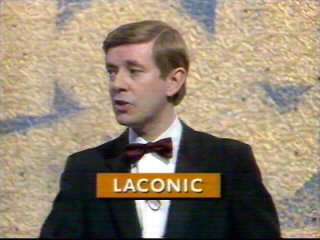 Host, Henry Kelly
Host, Henry KellyThe other tactic was that you could play or pass control of the subject. Playing meant that you got the 2 point zone and the (catchphrase) "big 4 point zone", and you could only buzz in when the clock was in these zones, your opponent getting control during the 1 and 3 point zones. The situation was reversed if you passed on a subject. The person that was "playing catch-up" as Kelly put it (or "behind", as any normal person would say) would decide whether to play or pass. Answering a question wrongly meant that one of your "time zones" got passed over to your opponent, thus preventing multiple guesses in the same zone. It was nine points or more for a win.
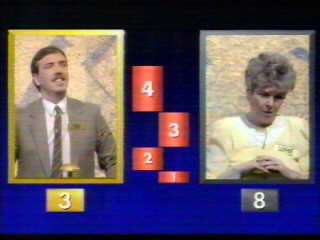 The final in progress
The final in progressWinning a show meant you appeared in the final at the end of the week. Winning the weekly final meant going through to some semi-finals, which eventually went on to a grand final (at which point Kelly would whip out his dinner jacket).
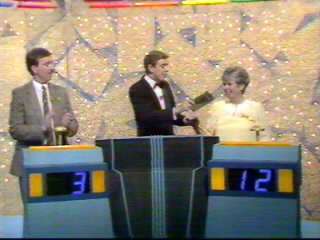 A dinner jacketed Henry Kelly awards the eventual winner of Going for Gold with some tickets to the Olympic Games
A dinner jacketed Henry Kelly awards the eventual winner of Going for Gold with some tickets to the Olympic GamesThe series winner would almost always get a holiday to somewhere far away Australia, New Zealand, the USA or - on one occasion - the Olympic Games. A short film ramming the point home would appear in the break between rounds 1 and 2. As there were only five promo films, we got to learn these off by heart pretty quickly.
The original show perhaps dragged on a bit too long, but the basic format was sufficiently sound for it to be revived with minor modifications as One to Win in 2000, and then again under the original title in 2008, but with the modified One to Win rules still in effect.
Champions
| 1987-88 | Daphne Hudson (England) |
| 1988-89 | Erik Matteson (Norway) |
| 1989-90 | Howard Atkinson (England) |
| 1990-91 | Luc Sucholtz (Belgium) |
| 1991-92 | Soren Bergman (Denmark) |
| 1992 | Christine Coslett (Wales) |
| 1993 | James Deloz (Belgium) |
| 1994 | Mieke Poelman (The Netherlands) |
| 1995 | Sven Goll (Norway) |
| 1996 | Mike Ramsden (Kent) |
The first five series aired during the winter, split in half by the Christmas break. The sixth series went out in the autumn, the last four aired during the summer. The final BBC series featured competitors from the UK only.
The Channel 5 series was won by Iwan Thomas.
Key moments
The contestants would wave, smile or grimace interestingly in the show's opening sequence. There was always one.
Catchphrases
"And now on to the first round proper."
"Incorrect - out of the rest of the question!"
"The category is (whatever) - select!"
(In the 'Four-In-A-Row' Round): "Are you ready and happy to play?"
"You have chosen (whatever subject), and on that subject, your time starts....now!"
(Just before the final round): "Lady and gentleman, will you please follow me - and (to the viewers) why don't you come too?"
(In the final round): "The subject is (whatever) - there's a clue on the screen for you watching at home - on that subject, will you play or pass?"
"You're playing catch-up..."
"You have control of the game - time passes to you and continues....now!"
Inventor
Based on the unsold US pilot Run for The Money where it was produced by ABC and filmed at the ABC Television Center (now The Prospect Studios).
Theme music
Composed by Hans Zimmer (who went on to compose the music to the successful movie Gladiator) and Sandy McClelland.
The celebratedly-bad Euro soft rock tune went as follows:
Going for gold! The heat is on, the time is right, It's time for you, for you to play your game. 'Cause people are coming, everyone's trying, Trying to be the best that they can, When they're going for... going for... Gold.
Opening titles from Series 1
But that's not all! We bet you never knew there was another verse, but there was. As far as we know, it was only heard once, during a clips compilation in the first semi-final of series 1. And here's the lyrics for the long version (note extra bridge section too!).
Going for gold! The heat is on, the time is right, It's time for you, for you to play the game. 'Cause people are coming, everyone's trying, Trying to be the best that they can, To reach for the sky 'cause the stakes are so high, When they're going for, going for gold!
Go for it - for gold! Go for it - only the best survive Go for it - for gold! Go for it and you can take the prize Go-ing for... Gold!
Making a way in the world, It's hard and easy. Trying to get where we wanna be, That's the toughest thing of all. All we need is a little more getting-it-right, All we need is a little more sa-cr-i-fice,1 Learning more and more, what we're striving for, When we're going for gold.
<Instrumental>
So the heat is on and the time is right, It's time for you, for you to play the game. 'Cause people are coming, everyone's trying, Trying to be the best that they can, To reach for the sky where the stakes are so high, We're all going for, going for gold!
Go for it - for gold! Go for it - only the best survive, Go for it - for gold! Go for it and you can take the prize, Go for it - for gold! Go for it - only the best survive!
1 This line is particularly unclear, and may be "All we need is a little more stay-in-the-fight".
Trivia
The UK version inspired the French to make their own version called Questions pour un Champion, which launched across the Channel exactly one year later in 1988 where it became a huge success and is still running to this day as of 2023. Apparently, the prime time special is more popular than blockbuster films or international football matches.
It is said that while the show was based at Elstree, the studio audience on occasions amounted to a grand total of… six.
A staple in the 1.50pm slot, a 10.05am morning repeat would be shown the next day before children's programming for the first three series and for the second half of the fourth series. For the last series, the show moved to an earlier slot of 12.35pm.
Web links
Pictures
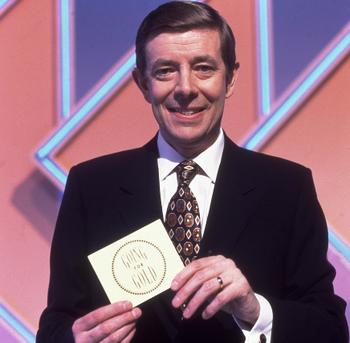 Henry Kelly and his questions cards.
Henry Kelly and his questions cards.See also
Videos
The very first episode.

